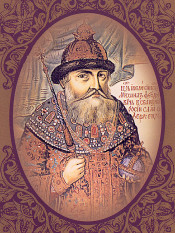
The founder of the Romanov dynasty, Tsar Mikhail Feodorovich illustrated in the materials of the Presidential Library
March 3, 1613 event that radically changed the course of its history occurred in Russia. Tsar Mikhail Feodorovich was elected to the Russian throne, who founded the new ruling dynasty - the Romanovs.
The grandfather of the future emperor of Russia, Peter the Great was a controversial person. However, in the life of the family were not only ups, but also downs. So, having been in disfavor with Tsar Boris Godunov, Mikhail's parents were forcibly tonsured as monks. However, after a few years, in this new capacity, they managed to rise again: Feodor Nikitich Romanov - in the monastic society Philaret - became the metropolitan of Rostov. Mikhail Feodorovich himself was captured by the Poles, then occupying Moscow. He was released in 1612.
By this time, Russia was experiencing a period of Time of Troubles, chaos was raging in the country...
In January 1613, Zemsky Sobor was opened in Moscow, which was to elect a new tsar. On the initiative of the free Cossacks, Mikhail Feodorovich Romanov was nominated, this choice was also supported by other estates, and two months later he was officially elected, and in July he crowned the throne in the Assumption Cathedral of the Moscow Kremlin.
The new sovereign has become a new hope. The people believed that they had made the right choice, and life under Mikhail Feodorovich will surely get better. Here is what D. V. Tsvetaeva says about this in the aforementioned book: “The Moscow prince- became the representative of all Rus’, the spokesman of the highest national aspirations, the organic embodiment of the ideal of external security and independence, internal unity and well-being. From here, according to the popular consciousness, the tsar’s closeness to all and the closeness of all to him was formed. A clan or a person who does not enjoy a broad popular disposition and trust could not have laid the foundation for a new dynasty”.
Apparently, the tsar did not show the character necessary for his high rank of hardness and ascended to the throne. According to some experts, the country's policy was then determined not by himself, but by his courtiers. “The first years of the reign of Tsar Mikhail Feodorovich still represent a historical moment in which not everything is accessible to scientific observation and not everything is clear from what has already been observed. Neither the personality of the young sovereign, nor the influences under which this person lived and acted, nor the forces that directed the political life of the country at that time are clear ... A circle of palace nobility — royal relatives, who along with the sovereign's mother are noticeable around the king lasted for influence and power, ”reports S.F. Platonov in Lectures on Russian History (1917).
Nevertheless, there were losses under Mikhail Feodorovich.. Some historians claim that the famous Treaty of Stolbovo with Sweden was achieved at a too high price for the country. This point of view is reflected in the “Lectures on Russian History” by S. F. Platonov: “According to the Treaty of Stolbovo in 1617, it was decided the following: Gustav-Adolf conceded to the Russians all his conquests, including Novgorod, and took 20,000 rubles. and left behind him the southern coast of the Gulf of Finland with the Neva and the cities: Yam, Ivan-city, Koporye and Oreshk, the same cities that were returned to Moscow in 1595 by Boris Godunov. Gustav-Adolph ... more than once said boastfully about Moscow that now this enemy without his permission cannot launch a single ship to the Baltic Sea”.
Another argument, unflatteringly describing Mikhail Feodorovich, is that the tsar allowed diarchy in Russia: his father became the “second state” - now the patriarch of Moscow and all Russia Philaret. Unlike his son, the researchers say, he was harsh and cruel. But at the same time he had a developed political mind - it was this quality that allowed him to manage not only the church, but also the state.
Whatever it was, but both camps of scientists recognize the fact: the founder of the Romanov dynasty was loved by his subjects. After the reign of Ivan the Terrible and the feuds of the Time of Troubles, perhaps such a king was needed: the one who gave the world and the right to vote. Therefore, on July 23, 1645, when Mikhail Fyodorovich died, the whole of Russia was covered with grief. You can read about this on the portal of the Presidential Library in “The Position of the Russian Society in the Reign of Mikhail Feodorovich” I. D. Belyaev: “Michael, after a short illness, completely unintentionally for the people, died, barely 49 years old. The Russian people cried a lot, burying the Tsar's favorite, and not without reason”.
Mikhail Feodorovich Romanov was buried in the Archangel Cathedral of the Moscow Kremlin.

